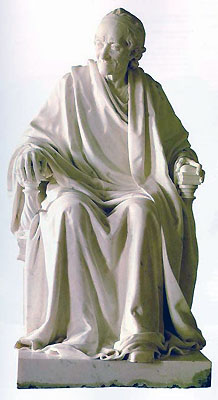HIS 112
Unit 5: Scientific Revolution and the Enlightenment
 |
François-Marie
Arouet, better know simply as Voltaire (1694-1778), embodied the
essence of the Enlightenement with his relentless critique and satire of
government, church and society. This is the work by the renowned
French sculptor, Jean-Antoine Houdon, commissioned by Catherine the
Great and presently in the Hermitage Museum in St. Petersburg. See some other photos of the works in the Hermitage collections.
|
 What you
must do in this unit
What you can do in this unit
What you
must do in this unit
What you can do in this unit
- You may listen to some further information about the
Enlightenment from my HIS 102 course.
- Check out the National Archives website devoted to the Declaration of Independence, which has images, transcripts and critical articles.
- When I teach the HIS 102 course on campus, I usually schedule a class on the development of classical music in the eighteenth century. Here is a link to my class notes on classical music (*.pdf). I have also put on www.nvcc.edu/itunesu/ (under HIS 102) a file with some of the selections of music that I play in that class.
Some videos that you can watch for this unit
- See the videos dealing with the Scientific Revolution and Enlightenment in the HIS 102 course.
- For extra credit please suggest to your instructor a relevant video for this unit of the course. Send the title of the video, the url and a brief explanation of why you find the video interesting and applicable to the material that is being studied in this unit.
Extra Credit Options
- Take the short 5-point quiz for chapter 26. Log into Blackboard and look under "Chapter Quizzes." You have five minutes to complete each quiz (multiple-choice questions).
- Watch Barry Lyndon
and write a one-page
paper (Was the movie an accurate depiction of eighteenth-century European life?) for a maximum of 50 points.
- In a well-researched, one-page paper (maybe two pages is also ok),
explain who fired the first shot of the American Revolution for a maximum of 50
points.
- For a maximum of 50 points extra credit, watch Amadeus
and write a one-page paper in which you examine which aspects of the European Enlightenment the movie
illustrated.
- For a maximum of 50 points, read Adam Smith's Wealth of Nations
(free copy at art-bin.com/art/oweala.html)
and explain, in a one-page paper, how his conception of capitalism does or does not match the characteristics of
present-day capitalism.
- For a maximum of 50 points extra credit, read Nicholas Copernicus, The Revolutions of the Heavenly
Bodies,
1543, excerpts, and write a one-page paper explaining some of the
revolutionary ideas found in this text. Please be sure to include
quoted material.
- For a maximum of 50 points extra credit, in a one-page paper, explain the principle points of
Immanuel Kant's idealist philosophy as expounded in his
Critique of Pure Reason
(free copy at www.hkbu.edu.hk/~ppp/cpr/toc.html).
- For a maximum of 25 points extra credit, in a long paragraph, What did Voltaire mean, in terms of
the European Enlightenment, when he wrote "let us cultivate our garden" at the end of
Candide
(free copy at www.literature.org/authors/voltaire/candide/).
- For a maximum of 25 points extra credit (maybe more), have a look at Isaac Newton, Principia Mathematica
and write a long paragraph explaining some of the revolutionary ideas
found in this text. Please be sure to include quoted material.
- For a maximum of 25 points extra credit, read Charles Louis de Secondat, Baron de Montesquieu (1689-1755), The Spirit of the Laws
(1748), excerpts, and write a long paragraph in which you explain
Montesquieu's main political ideas. Please be sure to include
quoted material.
- For a maximum of 25 points extra credit, in a long paragraph comment upon Voltaire's criticism of organized religion in his dictionary entry.
- For a maximum of 25 points extra credit, read Jean Jacques Rousseau (1712-1778): A Discourse Upon
The Origin and The Foundation of The Inequality among Mankind,
and write a long paragraph in which you explain Rousseau's ideas about
inequality. Please be sure to include quoted material.
- For a maximum of 10 points, read the Proclamation of Rebellion by
King George III as he reacted to the American rebellion (1775) and
write a short paragraph summarizing the King's view of his American
subjects.
- For 10 points maximum extra credit, answer the Declaration study sheet questions.
- For extra credit, please suggest a
relevant website for this unit of the course. Send the title of the site, the url and a
brief explanation why you find the information interesting and applicable to
the material being studied this unit.
|

